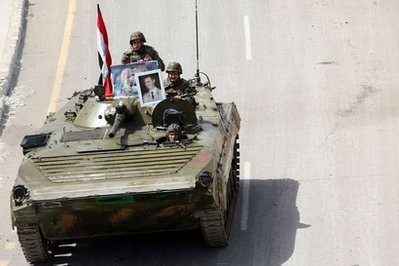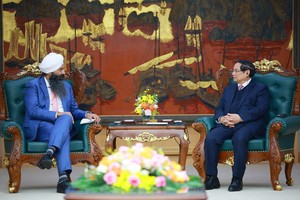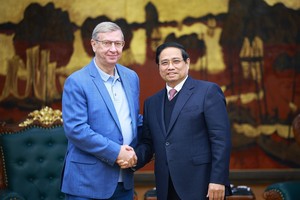Syrian security forces rounded up thousands of men as they went house to house in a bid to crush an anti-regime protest movement in the coastal city of Banias, as shots rang out in a Damascus suburb surrounded by troops, activists said.
The European Union meanwhile said an arms embargo and sanctions against 13 Syrian officials deemed responsible for the regime's brutal crackdown on protesters would come into force on Tuesday.
And the United Nations complained that Syrian authorities blocked one of its teams from entering the southern town of Daraa, epicentre of the protests, and voiced concern for the plight of Palestinian refugees there.

Western nations have launched a new bid to get the UN Security Council to condemn Syria for its deadly crackdown on opposition demonstrators, diplomats said.
Syria's refusal to let a UN humanitarian assessment team into the protest city of Daraa was raised by Britain at a Security Council meeting on Monday.
Britain is leading lobbying for a Security Council resolution warning Syria over its crackdown, diplomats said. Western nations are in parallel stepping up a campaign to stop Syria getting a seat on the UN Human Rights Council at a vote next week.
But efforts to pressure Syria are being held back by opposition from Russia, China and other countries on the 15-nation Security Council who say the French-British-US coalition staging air attacks in Libya has gone beyond its UN mandate.
Protest organisers called for a day of solidarity Tuesday with "prisoners of conscience" held in Syrian jails, according to a statement by the Syrian Revolution 2011, an Internet-based opposition group.
Rami Abdul Rahman, head of the London-based Syrian Observatory for Human Rights, said water, electricity and telephone lines were cut off in Banias, on Syria's northwest Mediterranean coast.
"There were house-to-house raids overnight and it continued on Monday morning," Abdul Rahman said, adding men were being rounded up for questioning in a stadium based on lists of names.
"Thousands of men, including youths, have been rounded up by the army and security forces... to be interrogated and they are being beaten. More than 400 are still being held," he said.
Abdul Rahman told AFP "residents hoped that the army would arrest regime supporters who have terrorised Banias but instead the army arrested unarmed residents."
Among those detained were protest leaders and doctors at a hospital which was encircled by the military, according to the Syrian Observatory.
Syria's embattled government has ridden out the worst of the uprising, a senior official told The New York Times in an interview.
"I hope we are witnessing the end of the story," Bouthaina Shaaban, an adviser to President Bashar al-Assad who often serves as a spokeswoman, told the US paper in an hour long interview.
"I think now we've passed the most dangerous moment. I hope so, I think so," Shaaban said giving a glimpse at the mindset of a 40-year-old regime that has barred most foreign journalists from Syria since the beginning of the uprising.
"We want to use what happened to Syria as an opportunity," Shaaban added. "We see it as an opportunity to try to move forward on many levels, especially the political level."
The Times reporter was allowed in the country for a few hours, the report added.
Several protesters were arrested Monday night in the city centre of Damascus where some 200 rallied calling for "lifting the siege" imposed on several cities and "an end to the shootings," the Syrian Observatory said.
The military said six soldiers, including three officers, were killed in clashes Sunday as the army pursued "armed terrorist groups" in Banias, Homs and the countryside around the southern town of Daraa -- three protest hubs.
Tanks rumbled into several districts of the central industrial city of Homs and deployed along the corniche in Banias overnight Saturday-Sunday, activists said.
"Banias is cut off from the outside world," one activist said.
Owners of Internet software shops have also been arrested, he said, although detainees aged over 40 had been released.
Hundreds of women took to the streets of Banias on Monday to demand the release of men arrested by security forces and some even charged checkpoints to vent their anger, activists said.
Meanwhile gunfire broke out in the western Damascus suburb of Muadamiya in the morning and telephone lines were cut, an activist said.
"Troops and security forces are circling Muadamiya," he said.
A witness confirmed the report, saying the main road to the Damascus suburb had been sealed off.
Despite the heavy-handed repression, the Syrian Revolution 2011 Facebook page, which has been a motor of the protests, said "demonstrations will continue every day" and called for "a Tuesday of solidarity with prisoners of conscience held in the jails of the criminal Syrian regime."
Embattled President Bashar al-Assad, quoted on Monday in pro-government Al-Watan newspaper, vowed to press ahead with reforms and forecast the political crisis in Syria was nearing an end.
"The crisis will pass and end, and the question of administrative, political and press reforms will advance," Assad was quoted as telling a delegation of residents the main port city of Latakia, north of Banias.
The military launched its action in Banias and Homs after ending a 10-day lockdown in which dozens were killed and scores detained in Daraa.
In Brussels, an EU statement said sanctions on Syria had been adopted and would take effect Tuesday. The United States has warned it would take "additional steps" against Syria if it continues its deadly crackdown.
"The (EU) Council has adopted a regulation and a decision providing for an embargo on exports to Syria of arms and equipment that could be used for internal repression, as well as a visa ban and an assets freeze," it said.
The visa ban and assets freeze targets 13 officials and associates of the Syrian regime identified as responsible for the violent repression against the civilian population in Syria, the EU statement added.
























